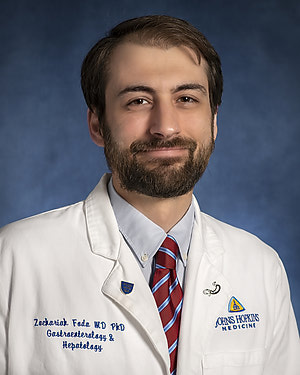Colon Cancer Risk Assessment Clinic
The Johns Hopkins Colon Cancer Risk Assessment Clinic is designed for people with a personal or family history that indicates an increased risk of colon cancer. Up to 25% of colon and rectal cancers are related to a family history and approximately 5% to 10% are a result of an inherited genetic syndrome.
On This Page: Care Locations | What to Expect | Our Team | Patient Resources
Who Should Consider a Colon Cancer Risk Assessment
You could be at an increased risk of colon cancer and could benefit from a consultation in our clinic if you or your family members have had:
- Family history of multiple cancers, including colon cancer (especially before age 50) and uterine cancer
- History of polyps (especially multiple or large colon polyps)
- A genetic syndrome that runs in the family such as Lynch syndrome (also called hereditary nonpolyposis colorectal cancer)
Request an Appointment: 410-502-7082
How Our Team Can Help
Our team of gastroenterologists and genetic counselors will help you assess your risk of developing colorectal cancer and determine an appropriate screening schedule.
Genetic testing is a delicate procedure. Our experienced genetic counselors are at the forefront of research in this field and can support all of your needs, including identifying which family members should be tested and helping you navigate insurance claims.
If we find that you are at an increased risk for colon cancer, we will also provide longitudinal care to help coordinate your screening.
Care Locations
-
The Skip Viragh Outpatient Building
5th Floor
-
Johns Hopkins Outpatient Center
7th Floor
What to Expect During Your Appointment
Before your appointment, we will ask you to fill out a questionnaire and share your medical records to help us learn more about you and your family.
During your first appointment, you will meet with an expert gastroenterologist and a genetic counselor at the same time. We are one of a handful of clinics in the U.S. offering this convenient, patient-centered, integrated care. Your appointment may last up to an hour and a half to give us plenty of time to get to know you and discuss your colon cancer concerns.
During your appointment, we will evaluate you from medical and genetic standpoints. Your appointment will include:
- Education about genetic conditions that may increase your risk of colorectal cancer
- Recommendations about cancer prevention
- Cancer screening recommendations based on your personal and family history
- Genetic testing, if appropriate, to confirm whether you have a genetic condition that increases your risk of colon cancer
- How to best manage your genetic condition
After the appointment, you will receive:
- Findings and recommendations via MyChart. You can share them with your referring doctor and family members who may be affected.
- Information you can take home and review at your convenience, including educational pamphlets, links to websites and support groups
- Information about research projects and clinical trials that may benefit you
- Referrals to other specialists who might need to be involved in your care, including endoscopy specialists, surgeons, gynecologists, endocrinologists and oncologists






